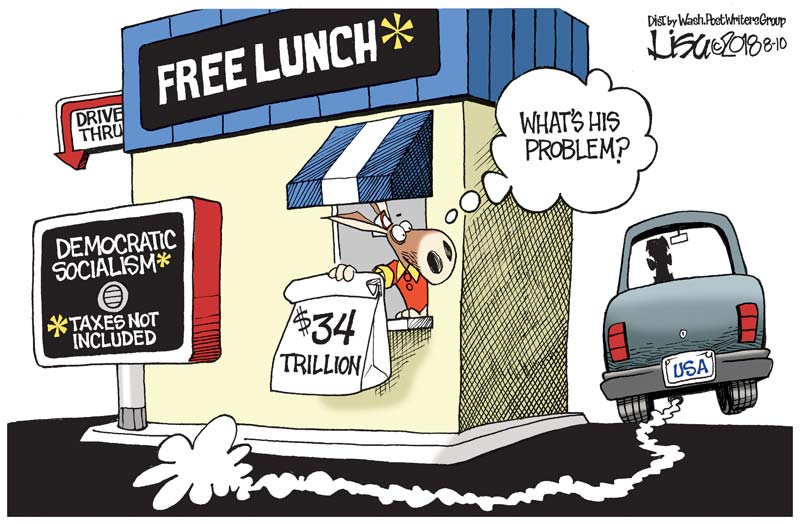
The obstruction of people like me is, obviously, one of the reasons that we can't have "nice things." (Though, just as obviously, we obstruct because we think the not-nice aspects would outweigh whatever benefits might ensue.)
But the obstruction doesn't only come from the right. The American left has developed a fantasy that a large expansion of the welfare state can be financed by taxing only the rich - a term that is ever more frequently defined to exclude urban professionals earning well into the six figures.
In fact, European welfare states pay for themselves by taxing ordinary people very heavily. If the U.S. income tax were designed along Scandinavian lines, its top tax bracket would kick in at around $45,000 a year. We'd also have a heavy value-added tax - a highly efficient, but also regressive, kind of sales tax.
It cannot be otherwise. The top quintile of households (those making more than about $115,000 a year) do take home an astonishingly large share of U.S. national income. But if you took every dollar they earned and left them to starve, it would not quite pay for a Danish-style welfare state. Obviously, starving your tax base is not ideal fiscal policy. Yet just as obviously, long before you had shaken every last dollar from their pockets, they would have fled the country, hidden their money or decided to work less in order to become net recipients rather than net donors.
But the left's base doesn't want to hear about taxing itself. So left-wing policy analysts are forced to fund every proposal with the same few pieces of high-income tax capacity --- eliminating the cap on Social Security taxes and raising the top marginal income-tax rates on high earners.
Together, some of these proposals come close to confiscating every dollar that these people earn above the level of the next-lowest quintile. But perhaps you, budding socialist, see that as a feature rather than a political disaster. The question remains: After you've taken this money to pay for Medicare-for-All, what do you do for an encore? You cannot spend this money on Medicare-for-All and free college and expanding Social Security and a universal basic income or a job guarantee. Until the left acknowledges that the welfare state they want means ordinary people sacrificing a great deal of current consumption, we are not going to have that welfare state.
This, however, is not even the biggest factor obstructing left-wing dreams. The real thing standing between them and their proposed Scandinavian paradise is Father Time.
Let's return to national health care. It's practically a mantra on the left that every other country in the developed world has a marvelous system that provides better outcomes at lower costs, so why would we want to stick with the obviously subpar American model?
In fact, it's debatable whether the other countries' systems get better outcomes: Once you've controlled for factors that have almost nothing to do with the health-care system, such as homicides and car accidents, it's not clear people in other countries live any longer. But it is not debatable that they are cheaper; we are the only country in the world that spends a fifth of our gross domestic product on health care.
And why do we spend so much? Because everything is organized to make the system costly, from the cost of labor to the number of machines we use to the way we construct our hospitals. (Yes, we pay a lot for drugs, but drug spending is only a small fraction of total spending, so this cannot account for the difference - and neither, before you ask, can insurer profits or administrative costs).
It is possible that we could have controlled these costs, once, as other countries have done. But as any legislator, or parent, will tell you, it is a lot easier to not do something than to stop doing it. Some things we've done can't be undone at all - our hospitals are now constructed around private- or semi-private rooms with intensive electronic monitoring of patient status, and we can't convert them to space-saving, labor-economizing open wards without spending more than the project would save us.
Other cost-saving measures are theoretically feasible but politically catastrophic. American health-care workers are very highly paid compared with their international counterparts, and we have a lot of them, all very well politically organized. Those people have planned their lives around their steady jobs and strong earnings - mortgages, car payments, college tuitions. Suddenly announce that you're slashing everyone's salary by a third to make national health care affordable, and you'll have a modern-day Bonus Army marching on Washington, scalpels in hand.
This is why no nation in the world has managed to make sustainable cuts to their health-care system. They have kept costs from growing, yes, but except in the case of fiscal crises such as the Greek debt disaster, no country has actually slashed what they were already spending. If others can't, then it's probable we can't either - at least, short of a Soviet-style revolution, which is a cure worse than the disease.
What we're talking about is a phenomenon known as "path dependence": What you can do now depends on what you've already done. Most national health-care systems were created at a time when health care couldn't do so much - in the 1950s, when President Dwight D. Eisenhower had a heart attack, he got the state-of-the-art treatment for the era, which consisted of blood thinners and dietary changes. Now he'd be a candidate for all manner of procedures running well into the high five figures.
In 1948, when Britain's NHS was created, the country was spending about 1.2 percent of is GDP on health care. In 1960, when Canada was completing the expansion of its Medicare system, they were spending about 5.5 percent of GDP - which is also roughly what we were spending when we passed our Medicare program in 1965.
The tax burden necessary to fund a program when the total health expenditure is 5.5 percent of GDP is obviously much different from the tax burden needed when it's four times that size. And national health care is not the only system facing these sorts of path-dependency problems.
Notably, almost all the foreign programs that American social democrats envy were enacted during Europe's long post-war economic and demographic boom. That meant that the initial cost of these systems was fairly low - young people don't need much in the way of health care or pensions, and economies at full employment don't spend a lot on unemployment insurance or job retraining. As incomes soared, it was comparatively easy for government to skim some of the surplus for their new social insurance schemes, because even as their taxes went up, workers still got to take more money home every week. Governments ran into problems when the boom stopped, of course, but by then, political sentiment had cemented those programs in place.
What was easy in 1960 looks herculean as 2020 approaches. Economic growth has slowed, and populations are aging, which raises the cost of any proposed program and requires you to fund heavy losses on someone to fund it, either workers in those industries, or taxpayers. As psychologists tell us, people are "loss averse" - they care much more about losing something they have than about equivalent potential gains. Given the mammoth cost of socializing the U.S. economy now, and the huge number of people who face substantial losses, I'd argue that we should probably change "herculean" to "impossible."
Entomologist E.O. Wilson is said to have quipped about communism, "Great idea. Wrong species." And given current conditions in the United States, even someone devoted to the idea of an expansive social democracy might reasonably say "Right system. Wrong time."
Megan McArdle is a Washington Post columnist who writes on economics, business and public policy. She is the author of "The Up Side of Down." McArdle previously wrote for Newsweek-the Daily Beast, Bloomberg View,the Atlantic and the Economist.


 Contact The Editor
Contact The Editor
 Articles By This Author
Articles By This Author